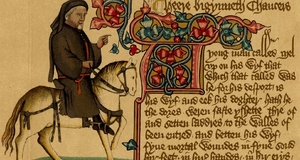Anti-Semitism and Religious Intolerance in Aristocratic Age English LiteratureIn contrast, The Merchant of Venice by William Shakespeare, putatively inspired by The Jew of Malta,conveys a contemporary anti-Semitic theme,while simultaneously challenging prevailing anti-Jewish sentiment. Shakespeare depicts Shylock, a Jewish usurer, as avaricious, wicked, and prejudiced when he agrees to lend Bassanio, a young Venetian noble, three thousand ducats so that he can court Portia, a wealthy noblewoman (Shakespeare 1.3.168-169). However, though this act appears ostensibly magnanimous, Shylock ultimately stipulates that “an equal pound/Of your fair flesh” (Shakespeare 1.3.149-150) be remunerated if Antonio fails to pay the loan. This barbaric means of bartering depicts Shylock as savage, cruel and greedy; when this general besmirchment is extrapolated to all Jews, it reflects anti-Semitic sentiment that pervaded fifteenth and sixteenth century Europe, when Jews were shunned as unbelievers in the Protestant faith and branded scapegoats for incidents such as the Bubonic plague and the crucifixion of Christ. In addition, Shakespeare’s The Merchant of Venice continues to smack of an anti-Semitic theme, as evidenced by Shylock’s indirect characterization as a bigot. When Shylock confronts Antonio on matters concerning the latter’s loan, he states, “I will buy with you, sell with you, talk with you, walk with you, and so following: but I will not eat with you drink with you, nor pray with you.” (Shakespeare 1.3.34-37). In this episode, Shylock repudiates the very thought of breaking bread – suggestive of a communion – or engaging in any religious activity with Antonio, who is Christian. This forthright and emphatic declaration intimates that Shylock harbors anti-Christian sentiment, owing to his aversion towards interacting on a spiritual level with Antonio. When Shylock comes face to face with Antonio, Shylock acerbically remarks, “I hate him for he is a Christian…Cursed be my tribe/If I forgive him”(Shakespeare 1.3.42, 51-52). These blatant discriminations against Christians characterize Shylock as an intolerant and wicked man. Thus, Shakespeare’s depiction of Shylock tacitly suggests, by transitivity, an inherent depravity associated with the Jewish race because his central identity is undeniably intertwined with his being Jewish. Examples of this inexorable correlation abound, as characters constantly address Shylock by employing sundry versions of the name “Jew,” to such an extent that the word has come to symbolize him predominantly.Furthermore, when Launcelot Gobbo, one of Shylock’s servants, affirms his identity to his father, Old Gobbo, by declaring himself “Launcelot, the Jew's man” (Shakespeare 2.2.89), it is quite compelling to note that Launcelot uses the word Jew to allude to Shylock instead of the Jew’s own name. Shylock’s chief label as a Jew is only further reinforced when Launcelot, while contemplating whether or not to flee from his master, mentions “the Jew” once again, this time going so far as to pronounce, “Certainly the Jew is the very devil incarnation” (Shakespeare 2.2.27). Accordingly, Launcelot’s words buttress the notion that the word “Jew” has slowly morphed into Shylock’s epithet. Interestingly, Launcelot also divulges an anti-Semitic tone and, hence, theme owing to his direct definition of the Jew as the devil. Shylock even refers to himself as a Jew many a time, specifically noted when he states, “I am a Jew” (Shakespeare 3.1.58). Therefore, by virtue of this belabored intrinsic correlation, Shylock can be identified by his Jewishness. Moreover, though, in context, the Launcelot’s aforementioned statement can be construed as specific to Shylock, it encompasses all Jews by transitivity, due to Shylock’s inherent Jewish identity. Shakespeare’s work also connotes an anti-Semitic theme by vilifying Shylock as greedy, despite the fact that he withstands much abuse at the hand of Antonio. Upon learning that Antonio’s ships had been wrecked, Shylock recounts multiple cases of cruelty he has endured owing to Antonio: "He hath disgraced me, and hindered me half a million; laughed at my losses, mocked at my gains, scorned my nation, thwarted my bargains, cooled my friends, heated mine enemies; and what's his reason? I am a Jew” (Shakespeare 3.1.54-58). Shylock states that his suffering can be attributed to his being Jewish, thereby connoting an anti-Semitic theme. Furthermore, ridiculed by Antonio for their usury business practices, Shylock and other Jews are stereotyped as greedy money-grubbers. This characterization as a stingy people further hints at anti-Semitic theme that also pervaded Europe during Shakespeare’s lifetime. In fact, Jews during this era were similarly scorned for their usury, despite the fact that this money lending practice was the only means by which Jews could garner wealth. At the time during which this play was written, Jews were shackled in the relentless chains of oppression, widely viewed with contempt amid an increasingly harsh religious and political milieu molded by the Protestant Reformation. An Anti-Semitic theme is implied when Shylock reiterates Antonio’s acerbic affronts in response to the latter’s request for a loan: “You call me misbeliever, cut-throat dog, And spit upon my Jewish gaberdine, And all for use of that which is mine own” (Shakespeare 1.3.111-113). Antonio’s offensive and belligerent swearing dehumanizes Shylock and tarnishes the image of the Jew, thereby further reinforcing an anti-Semitic theme, as Shylock’s identity is directly associated with his being Jewish. This reference is consistent with anti-Semitic sympathies prevalent during the Aristocratic Age, when Jews were still widely unaccepted in England. A nationally pervasive sentiment of Jewish intolerance is strongly suggested, if not persuasively proven, by evidence of the perpetuation of official English policy of Jewish banishment, unchallenged and unchanged since Jews were initially expelled from England in 1290. Accordingly, such slurs provide a credible representation of the anti-Jewish prejudices that plagued England throughout Shakespeare’s lifetime. During Antonio’s trial, multiple characters ruthlessly debase Shylock, thereby bolstering an anti-Semitic theme. When Shylock insistently demands a pound of Antonio’s flesh in spite of the latter’s recent hardships, he is further demonized as a monster. The Duke of Venice slanders Shylock, branding him a “stony adversary, an inhuman wretch/Uncapable of pity, void and empty/From any dram of mercy” (Shakespeare 4.1.3-6). Likewise, Gratiano, Bassiano’s friend, demeans Shylock during the trial by remarking, “Not on thy sole, but on thy soul, harsh Jew Thou makest thy knife keen” and continues to berate the man by calling him a ravenous wolf (Shakespeare 4.1.133-134). Described as a callous and ruthless beast only interested in procuring his money, the role of villain is once again thrust upon the “reviled” Jew, as was often done in England during Shakespeare’s lifetime. These abrasive retorts ring with anti-Semitic undertones from the characters in the play and aptly illustrate the oppression under which Shylock the Jew contends. After Portia, a wealthy noblewoman involved in the trial, stipulates that Shylock is only entitled to Antonio’s flesh – not his blood (Shakespeare 4.1.306-312), Shylock becomes an overtly targeted victim of Anti-Semitism when he is compelled to convert to Christianity as redress. Accordingly, Shylock is not portrayed as a villain who happens to be Jewish but, rather, as a man whose villainy is intrinsically intertwined with his Jewish identity. In essence, he is depicted as a depraved figure because he is Jewish. All of his shortcomings and unsavory characteristics are, in fact, directly attributed to his being a Jew. Shylock’s Jewishness constitutes the basis of the court’s dispute with him because one of the remedies the court prescribes for Shylock as a means for redress is his conversion from Judaism to Christianity. Accordingly, the court connotes that Shylock’s indictable flaw that requires correction is his being Jewish. Thus, indirectly, the passage surges with anti-Semitic feeling expressed by the characters during the trial. Since Shylock is defined by his being a Jew and that fact is his salient characteristic, any critique of him can be deemed anti-Semitic. Accordingly, the abusive behavior exhibited towards Shylock during the trial reflects an anti-Semitic theme and exemplifies this type of prejudiced thought that permeated England at the time, which favored unfair treatment towards Jews. Like Shylock, who is robbed of his freedom of worship by Christians, Jews have also been repeatedly forced to convert by the sword throughout Europe, particularly during the Crusades. Likewise, many Jews were not allowed to become a part of English society unless they converted to Christianity. The prevalent anti-Semitic theme in The Merchant of Venice serves to ultimately satirize the contemporary societal view towards Jewish people by showing that, in spite of Shylock the Jew’s ugly depiction, which society would have deemed politically correct, Shylock is actually much more than a caricature of a villain: he is a victim of circumstance and a human being. For example, Shylock launches into an emotional speech, questioning why Antonio has been so cruel to him, as they are both human beings. Shylock exclaims, “I am a Jew. Hath/not a Jew eyes? hath not a Jew hands, organs,/dimensions, senses, affections, passions?... And if you wrong us, shall we not revenge?” (Shakespeare 3.1.58-67). The last rhetorical question depicts Shylock as vindictive, as he plans to avenge all of Antonio’s abusive public mockery unto himself and fellow Jewish merchants. As revenge is not an acceptable Christian pursuit, Shylock may seem further debased by his decision to seek revenge rather than turn the other cheek. However, this negative portrayal is initially presented so that it can ultimately be overturned within the work. Ironically, a relatively subtle expression of Shylock’s humanity ultimately transcends any negative depiction of Shylock, thus surprisingly causing the other characters to appear rather callous for acting so belligerently towards him. When Shylock inquires, “If you prick us, do we not bleed?/if you tickle us, do we not laugh? if you poison/us, do we not die?” (Shakespeare 3.1.64-66), he shows himself to be a victim of prejudice and an individual capable of readily expressing a plea for tolerance. Shylock expresses his humanity, albeit veiled behind a mask of anger and vengeance. Further reinforcing Shylock’s divulged humanity, esteemed critic John R. Cooper states that “We are given not only an insight into the degree of his malice but also a glimpse into Shylock’s all-too-human mind. We see his motives arise from a nature like ours, one that looks for vengeance when wronged.” Consequently, what was, ostensibly, an anti-Semitic theme that reflected prevailing societal views ultimately, in an ironic twist, gets trumped by the newfound humanity that is now ascribed to this Jew, and, by association, the Jewish race. Accordingly, this anti-Semitic theme ultimately mocks those who espoused such anti-Semitic attitudes.Continued on Next Page » Suggested Reading from Inquiries Journal
Inquiries Journal provides undergraduate and graduate students around the world a platform for the wide dissemination of academic work over a range of core disciplines. Representing the work of students from hundreds of institutions around the globe, Inquiries Journal's large database of academic articles is completely free. Learn more | Blog | Submit Latest in Literature |
















